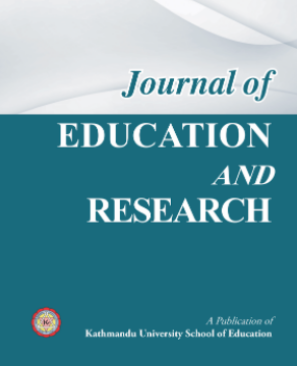
Relationship Between Trainee Reactions and Training Transfer: Findings From a Qualitative Study in Nepal
Original Article
Journal of Education and Research, Volume 13, Issue 2, 2023, 7-23, https://doi.org/10.51474/jer.v13i2.712
Publication date: Sep 25, 2023
Views: 619 | Downloads: 603
How to cite this article
APA
In-text citation: (Bhattarai, 2023)
Reference: Bhattarai, A. (2023). Relationship Between Trainee Reactions and Training Transfer: Findings From a Qualitative Study in Nepal. Journal of Education and Research, 13(2), 7-23. https://doi.org/10.51474/jer.v13i2.712
Reference: Bhattarai, A. (2023). Relationship Between Trainee Reactions and Training Transfer: Findings From a Qualitative Study in Nepal. Journal of Education and Research, 13(2), 7-23. https://doi.org/10.51474/jer.v13i2.712
Vancouver
In-text citation: (1), (2), (3), etc.
Reference: Bhattarai A. Relationship Between Trainee Reactions and Training Transfer: Findings From a Qualitative Study in Nepal. Journal of Education and Research. 2023;13(2):7-23. https://doi.org/10.51474/jer.v13i2.712
Reference: Bhattarai A. Relationship Between Trainee Reactions and Training Transfer: Findings From a Qualitative Study in Nepal. Journal of Education and Research. 2023;13(2):7-23. https://doi.org/10.51474/jer.v13i2.712
AMA
In-text citation: (1), (2), (3), etc.
Reference: Bhattarai A. Relationship Between Trainee Reactions and Training Transfer: Findings From a Qualitative Study in Nepal. Journal of Education and Research. 2023;13(2), 7-23. https://doi.org/10.51474/jer.v13i2.712
Reference: Bhattarai A. Relationship Between Trainee Reactions and Training Transfer: Findings From a Qualitative Study in Nepal. Journal of Education and Research. 2023;13(2), 7-23. https://doi.org/10.51474/jer.v13i2.712
Chicago
In-text citation: (Bhattarai, 2023)
Reference: Bhattarai, Ajit. "Relationship Between Trainee Reactions and Training Transfer: Findings From a Qualitative Study in Nepal". Journal of Education and Research 2023 13 no. 2 (2023): 7-23. https://doi.org/10.51474/jer.v13i2.712
Reference: Bhattarai, Ajit. "Relationship Between Trainee Reactions and Training Transfer: Findings From a Qualitative Study in Nepal". Journal of Education and Research 2023 13 no. 2 (2023): 7-23. https://doi.org/10.51474/jer.v13i2.712
Harvard
In-text citation: (Bhattarai, 2023)
Reference: Bhattarai, A. (2023). Relationship Between Trainee Reactions and Training Transfer: Findings From a Qualitative Study in Nepal. Journal of Education and Research, 13(2), pp. 7-23. https://doi.org/10.51474/jer.v13i2.712
Reference: Bhattarai, A. (2023). Relationship Between Trainee Reactions and Training Transfer: Findings From a Qualitative Study in Nepal. Journal of Education and Research, 13(2), pp. 7-23. https://doi.org/10.51474/jer.v13i2.712
MLA
In-text citation: (Bhattarai, 2023)
Reference: Bhattarai, Ajit "Relationship Between Trainee Reactions and Training Transfer: Findings From a Qualitative Study in Nepal". Journal of Education and Research, vol. 13, no. 2, 2023, pp. 7-23. https://doi.org/10.51474/jer.v13i2.712
Reference: Bhattarai, Ajit "Relationship Between Trainee Reactions and Training Transfer: Findings From a Qualitative Study in Nepal". Journal of Education and Research, vol. 13, no. 2, 2023, pp. 7-23. https://doi.org/10.51474/jer.v13i2.712
ABSTRACT
This article explores the relationship between trainees’ reactions and the transfer of training in Nepal. Using a qualitative research design, six participants of a soft-skills training program were interviewed immediately after completing the training and after six months of the training program. The findings show that initial reactions may not be directly related to transfer: positive reactions will not always translate into transfers in the workplace. Conversely, an adverse reaction does not mean the trainee will not transfer, a unique finding from this study. It is argued that since the initial reactions may not predict transfer, organizations need to be careful in interpreting reaction statements as the trainees' willingness/ability to transfer. The study found that various forms of post-training organizational support, trainee proactiveness, and trainee’s locus of control can influence the transfer of training. The study reinforces how post-training supervisory and peer-support support can create an environment that entices trainees to transfer and that post-training trainer support, a factor usually not discussed in the literature, can also impact transfer.
KEYWORDS
REFERENCES
---
LICENSE
This work is licensed under a Creative Commons Attribution 4.0 International License.
